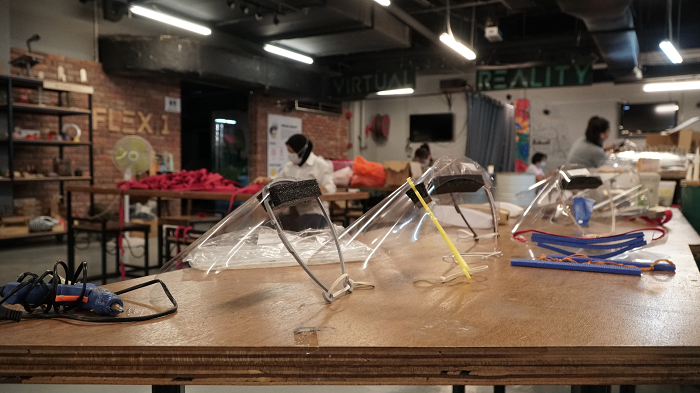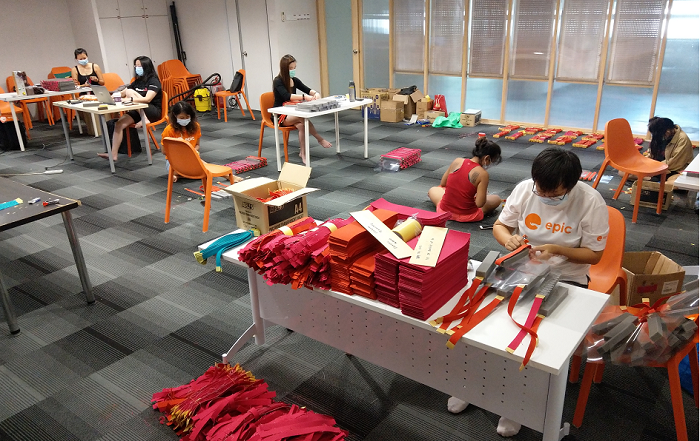Future of the maker movement is here, catalysed by Covid-19
By Gurpreet Singh & Rashvin Pal Singh April 14, 2020
- Decentralised platform allows everybody to tackle the same issue, communally & locally
- Initiative serves as evidence that digital collaborative efforts will drive future impact

COVID-19 has disrupted businesses and supply chains, globally. Everything is on pause. Yet, in the midst of a global pandemic, how has a community of makers successfully activated an economy halted by a virus, and mobilised a relief initiative that was able to raise almost RM135,000 to produce over 20,000 units of face shields, in a matter of days?
Me.reka, Taylor’s Me.reka Makerspace, Biji-biji Initiative and its network of partners were able to engage communal resources to maximise collective impact in aiding our brave frontliners in Malaysia. So how did a group of social enterprises do it?
The ideology behind the initiative is simple – global issues require localised solutions. But taking a fashionable statement and executing its premise to ensure it delivers as much impact as the meaning behind it is where the real answer lies.
Decentralised model of production to leverage capacity, maximise impact created
Decentralised digital production platform is what took the collective’s global thought and translated it into a localised context. Over the years, Me.reka and Biji-biji Initiative have amassed a network of makers, innovators, suppliers and logistics providers across Malaysia.
We have realised that our individual efforts, while still working towards a positive change, would be unparalleled if meshed into a whole community of suppliers, producers, and logistics where each partner is able to leverage from each other’s capacity and resources to ensure the greatest collective impact. And thus a decentralised model of production, capacity building, and impact creation was initiated.
It was no longer about what we each could do by ourselves, but rather how we could communicate effectively with others to ensure the desired impact is reached at greater efficiency.
The catalyst came last month, 21 March, when what started with a call for production partners to help build face shields for our brave frontliners, quickly became a digital platform that connected entire communities towards offering relief.
An open-source methodology allowed for designs, knowledge, resources, and expertise between groups to be shared. Within days, this initiative onboarded over 30 partners wanting to contribute in their own means. Producers and makers lacking supplies from different states are now connected with a network of supply chains, frontliners in need of Personal Protective Equipment (PPE) are able to make requests and have them filled by various partners. The decentralised platform allows everybody to tackle the same issue, communally and locally. Global issue, local solutions.

Covid-19 digital platform delivers 20,430 face shields to 44 hospitals
As of now, the Covid-19 digital platform by Me.reka and Biji-biji Initiative has delivered 20,430 units of face shields with an additional 11,700 replacement parts. As a result of increasing demand and necessity at the frontlines, the team also developed methodologies for producing spacers (Aerochambers) and patient isolation boxes (Intubation Boxes), delivering 1,495 and 56 units respectively. In total, Me.reka, Taylor’s Me.reka Makerspace and Biji-biji Initiative have delivered these PPE’s across Malaysia to 44 Hospitals, 11 Clinics, 3 PDRM’s (police departments) and 7 organisations at the frontlines. These numbers are publicly available through the platform, mereka.my/protecting-our-frontliners/
Individualism and notion of “I win, you lose” will no longer be supported
In line with gearing up for the near future, and moving forward with the platform, we believe that the most useful utilisation of this time, is through reflection. Reflection of our past methods, of our current stance, and our future progression. It has become clear that individualism and the notion of “I win, you lose” will no longer be supported. Trauma has a way of uniting us, and this pandemic that we face as family, community, country and as a world, has brought us together. Our initiative serves as empirical evidence that digital collaborative efforts will drive future impact and economies.
The collective firmly believes in reimagining the future of making. Implying that through digitally-empowered communities with localised access to tools, technologies and talents will allow for paradigm-shifting impact and innovation to materialise. The future of work will compel people to work together, leveraging off each other’s resources and building upon a communal capacity. Me.reka and Biji-biji Initiative foresees more collaborative working efforts between various players across industries, with a greater need for assets and resources sharing.
Hence, in the wake of our digitalisation strategy and the current pandemic, the collective aims to build upon this decentralised platform, allowing individuals and communities to access the machines, resources, and spaces, with the talents and expertise and the designs and content towards mobilising rapid solutions and fostering collaborative and innovative approaches.
This is the future of the maker movement. In moments of crises, it is not the singular forces monopolising our markets that will come to the aid. Rather, it is the power and effort of the community, working in tandem and complimenting each other’s efforts that will bring true collective impact.

Aligned with the idea of moving forward together, the collective understands that they cannot do this alone. The platform’s aim is to maximise global capacity, and to do so, it needs to scale. The collective has been liaising with organisations across the region including Vietnam Fablab and Guam Makerspace to help expand the decentralised effort. The collective has also been featured as a part of the Obama Foundation Leadership Network as a scalable solution with the potential as a crisis relief initiative and being able to mobilise and engage a community of under-utilised resources.
We are also pleased to have the support of Malaysian Digital Economy Corporation (MDEC) whose CEO, Surina Shukri, loves our initiative to leverage on digital in helping our frontliners. "This is very much in line with MDEC’s #DigitalVsCovid movement and a wonderful example where digital technology has been used to efficiently match supply and demand within a highly pressurised environment. More importantly, it highlights how change makers and digital leaders are innovating and mobilizing to solve real world problems with solutions that can be scaled,” she says. We are greatly encouraged by her support.
Fast forwarding efforts on this platform is also a very timely measure, as Malaysia’s Ministry of Health has just announced on April 13th on the increasing demand for PPE’s and the lack of stock to fulfill the need. "The use of PPE has risen by 2 to 10 times more than the normal use,” said Health director-general Dr Noor Hisham Abdullah. He also noted that the Health Ministry only had two weeks’ worth of PPE stock left. “If NGOs want to donate, please donate PPE to us (ministry). We are still welcoming PPE donations”. The announcement made clear the necessity for such local initiatives to help support the ever-increasing demand for PPE.
As such, Phase 2 of the platform is currently under works, where the team saw the need to be able to connect and empower the change-making communities, in providing for more PPE such as gowns, to the frontliners. The function of the platform is to be easily deployed to mobilise future relief efforts, by connecting people with the tools and technologies, to the communities needing these, within their local vicinity.The platform will also see unique features that provide accessibility to the B40 and marginalised communities to these tools and technologies. This will be viable through credits obtained from corporate sponsorships and partnerships.
The collective is inviting interested partners and experts to join and build the platform, as well as funders who would like to enable it to grow. Specifically, Me.reka and Biji-biji Initiative are looking for corporate and foundation partners to further develop this platform into a regional solution. It is hoped that the platform will bring about a long lasting change, with proper impact measurement metrics in place. The team can be reached via this link if you would like to join as a partner, funder or provide technological expertise! (visit, https://merekahq.typeform.com/to/reN9Wc).
Gurpreet Singh & Rashvin Pal Singh left their corporate careers seven years ago to pursue their desire to create meaningful change in Malaysia. They are cofounders of Biji-Biji Initiative and Me.reka


